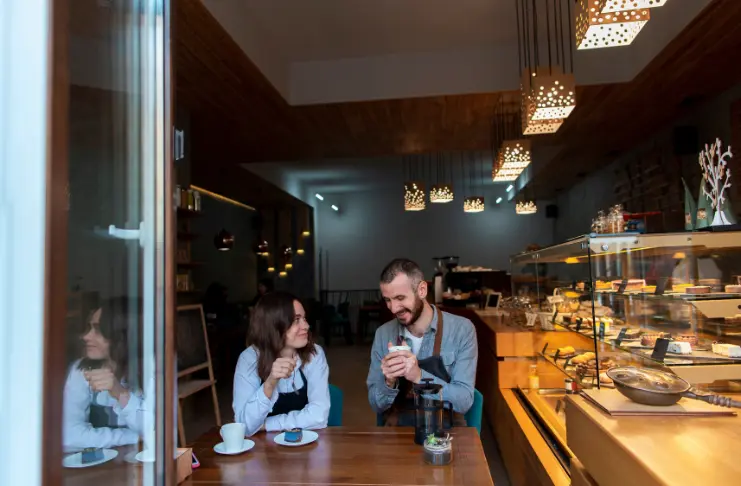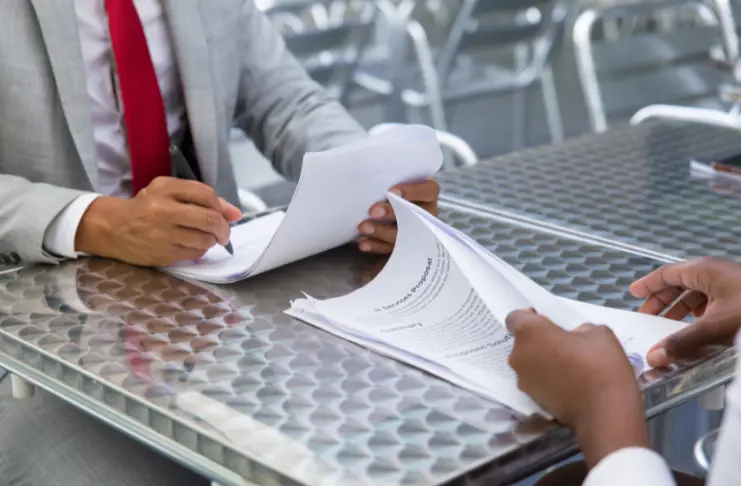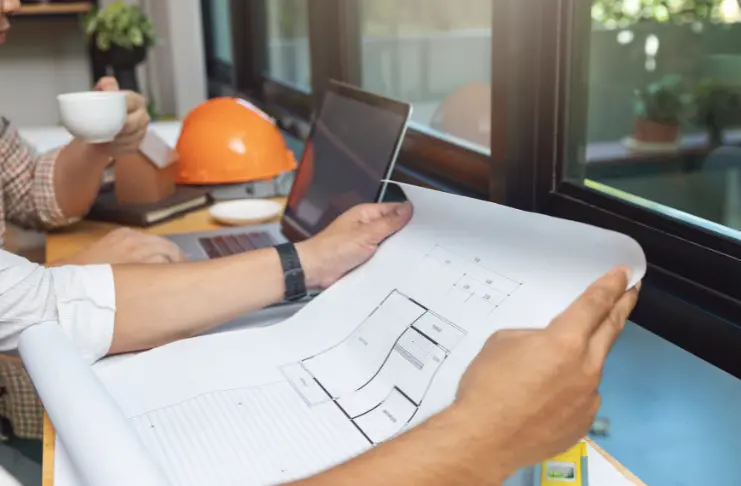
Dubai’s thriving food scene has made cafeterias one of the most accessible and in-demand formats for entrepreneurs entering the food and beverage (F&B) space. Compact, affordable, and in constant demand, cafeterias offer a high-traffic, lower-investment model, and demand isn’t slowing down anytime soon.
However, before investing in interiors or looking for suppliers, the first step is to understand the licensing framework. Setting up a cafeteria in Dubai involves far more than obtaining just a trade license.
From municipal approvals and food safety inspections to tenancy contract registrations, launching a cafeteria in Dubai involves multiple government approvals, specific documentation, and a cost structure.
This blog offers a clear, step-by-step breakdown of the cafeteria license cost in Dubai and the requirements for obtaining a license without any delays.
Why Dubai’s Cafeteria Market Is Booming?
The demand for small-format dining in Dubai has grown in line with shifts in how people live, work, and consume food. Cafeterias are increasingly favored by both entrepreneurs and customers. Unlike full-service restaurants, they cater to a broader range of price points, require less upfront investment, and fit well into high-footfall neighborhoods.
A lot of factors are contributing to the growth of cafe culture in Dubai, including-
- Tourism driving demand: Dubai welcomed a record 18.72 million visitors in 2024, a 9% increase from 2023. That influx, along with its global airport traffic (87 million passengers in 2023), creates sustained demand for quick and accessible food options near transit hubs and tourist districts.
- Explosive F&B growth: The UAE foodservice market is projected to reach $23.2 billion by 2025 and expand to $52.8 billion by 2030, growing at a 17.8% CAGR. Within this ecosystem, cafés and bars are registering the strongest outlet growth (~6.7% CAGR), making cafeterias a favorable format for entrepreneurs.
- Urban work culture: A booming base of office workers, remote professionals, and students favors compact eateries over sit-down restaurants. Cafeterias near metro stations and business zones cater directly to lunch crowds seeking fast, affordable meals without needing large spaces or full-service setups.
- Low entry barriers: Cafeterias are among the most cost-effective formats to launch in Dubai’s food sector. With smaller space requirements, limited service models, and fewer staffing needs compared to full-service restaurants, they offer a faster path to market. For many first-time restaurateurs, a cafeteria license becomes the ideal starting point to test concepts and establish a brand presence without overextending capital.
INDUSTRY INSIGHT
According to the 3rd annual Dubai Gastronomy Industry Report, Dubai was ranked the second-best gastronomy destination globally in 2024, indicating that Dubai’s global culinary reputation attracts food-savvy tourists and residents alike. In fact, Dubai is home to 13,000+ cafes and restaurants, establishing its position as a vibrant food market. For cafeteria owners, it underscores the importance of differentiation through cuisine, pricing, or customer experience to stand out in a saturated but opportunity-rich environment. |
What Is a Cafeteria License in Dubai?
A cafeteria license in Dubai is a specific type of trade license issued for the Professional or Commercial categories. It allows the holder to operate a small- to medium-scale food and beverage outlet serving ready-to-eat items such as snacks, beverages, and quick meals.
It is typically issued by the Department of Economic Development (DED) for mainland businesses, with additional approvals from the Dubai Municipality’s Food Safety Department.
The cafeteria license is distinct from a full-service restaurant license. It applies to outlets that generally offer counter service rather than table service and typically do not serve alcohol or provide elaborate dine-in experiences. This makes it ideal for fast-service models in high-footfall areas like Karama, Al Rigga, or near-office zones.
To obtain the UAE cafeteria license, business owners must meet zoning, hygiene, and layout regulations and submit the proposed kitchen design for inspection. Additional approvals may be required from Dubai Civil Defense, especially if gas installations or seating are involved.
Further, each cafeteria license is tied to a specific business activity code listed under the DED’s approved activity list.

Cafeteria License Cost in Dubai
Setting up a cafeteria in Dubai is a simple yet extensive process that involves significant investment, numerous permissions, and meticulous planning for space, equipment, overhead, and so on.
An important aspect of this is securing a cafeteria license, which includes a series of government-mandated fees and compliance charges that entrepreneurs must accurately budget for.
Wondering how much it costs for a cafeteria license in Dubai? Generally speaking, it costs about AED 24,000 to AED 35,000 to obtain a cafeteria license in Dubai. While the exact costs of restaurant licensing in Dubai can vary depending on the location, size, license type, and establishment type, here’s a breakdown of the fees and costs involved-
A. Government Fees
Government fees include all the charges, fees, and taxes levied by the Department of Economic Development and Dubai Municipality.
1. Trade License Fee (DED)
Every mainland business in Dubai must secure a trade license from the Department of Economic Development (DED), which grants legal permission to conduct commercial activities. The fee covers the company registration, market-related charges, and the issuance of the official license certificate.
The trade license can cost between AED 10,000 and AED 15,000, depending on the activity and scale.
2. Initial Approval Fee
This is the government’s preliminary clearance confirming that the proposed business activity is legally permitted and that the application can proceed. It’s one of the first documents you have to submit along with your application form and costs around AED 115-125.
3. Trade Name Registration Fee
Reserving your business name with the DED is mandatory to ensure it meets UAE naming standards and isn’t already taken. Plus, the name must align with naming conventions set by the DED. To register the business name with the authorities, you’ll need to pay a registration fee of AED 620-720.
4. Ejari (Tenancy Contract Registration)
The UAE cafeteria license cost also includes the cost of the tenancy contract. Ejari is the mandatory registration of your commercial lease under Dubai’s Real Estate Regulatory Agency (RERA). The registration fee can range between AED 195 to AED 500, depending on the rental agreement.
The Ejari registration links your business to a physical location, a requirement for all F&B licenses. Without Ejari, your license application cannot proceed.
5. Food License from Dubai Municipality
This license is issued by Dubai Municipality’s Food Safety Department and confirms that your facility meets hygiene and operational standards. It involves submitting a kitchen layout for approval, followed by an on-site inspection.
The food license cost starts from AED 10,000 and is an ongoing expense to be renewed annually.

B. Additional Costs
1. Immigration Card Fee
Any business in Dubai, including a cafeteria business, employing foreign nationals, requires an Establishment Card or Immigration Card issued by the General Directorate of Residency and Foreigners Affairs (GDRFA).
It registers the company with the immigration authorities, allowing it to manage foreign employment and immigration-related matters. The registration fee varies depending on the nature and size of the business.
2. Memorandum of Association
The MOA outlines your company’s ownership structure, business activity, and shareholding. It must be drafted in Arabic (or bilingual) and notarized for legal validity. The cost of MOA depends on how many partners are involved and the legal service charges.
What are the Requirements to Open a Cafeteria in Dubai
Before applying for your cafeteria business license, it’s essential to understand the operational and legal conditions your business must meet. These include complying with location-based criteria as well as preparing a complete set of documents.
Here’s a closer look at the key requirements of opening a cafeteria in Dubai-
A. Location Requirements
Your proposed cafeteria location must meet specific health and safety regulations set by Dubai Municipality and the Department of Economic Development (DED). These are crucial for securing food safety clearance and license approvals-
- The cafeteria or any food business should be located at least 50 meters away from a waste disposal facility.
- A 10-meter radius around the restaurant must always be kept clean.
- The space must be big enough to prepare the food and keep the equipment.
- The walls, roofs, and floors of the cafeteria must be washed regularly.
- There must be enough space for dirt disposal and the emission of smoke in case of an emergency.
- The toilet and storage areas must be kept separate and away from the kitchen to ensure food safety and hygiene.
- There should be three separate washbasins in the kitchen; one for cleaning utensils, one for washing vegetables, and last for meat (in case of non-vegetarian cafeterias).
- Kitchen equipment, departure routes, and cleaning supplies should be stored in marked places.
B. Document Requirements

To apply for a cafeteria license, you’ll need to prepare and submit the following list of documents-
1. For the Construction Plan of the Cafeteria
- Space for food processing, cooking, and storage.
- Location of the equipment where the food is processed
- Windows and the ventilation system
- Sanitary places
- All entry and exit points
2. For Food License Approval
- Approval certificate of the Food License from the Dubai Department of Economic Development (DED)
- Approval certificate from the Dubai Municipality’s Food and Safety Authority’s Planning Department
- Cafeteria space layout
3. For Trade License Approval
- Memorandum of Association (MOA) signed by all business partners
- Company name registration and name approval letter
- Cafeteria license application signed by all shareholders
- Passport copies of business employees and managers
Common Mistakes to Avoid While Getting a Cafeteria License
The cafeteria licensing process in Dubai may appear straightforward on paper, but in practice, small missteps can lead to delays, added costs, or even rejection.
Here are the most common mistakes to avoid-
1. Choosing the Wrong Business Jurisdiction
UAE offers licenses under two primary jurisdiction options for setting up a business or cafeteria. Selecting the proper jurisdiction is critical to how your cafeteria operates, as each setup features distinct regulations and offers different levels of commercial freedom.
- Mainland: Mainland businesses are licensed by the Department of Economic Development (DED) and are allowed to operate anywhere across the UAE without restrictions. Cafeterias under this setup can directly serve the general public, lease premises in any commercial area, and engage freely with both private and government clients.
- Free Zones: These are designated economic areas governed by independent authorities (e.g., DMCC, Dubai Silicon Oasis) that offer streamlined licensing, quick registration, and full foreign ownership. However, cafeterias licensed in a Free Zone are typically restricted to operating within that specific zone.
2. Choosing the Wrong Business Activity Code
Many first-time applicants select a general “restaurant” or “snack bar” code instead of the specific code for the cafeteria. This can lead to compliance issues and additional approvals later. Always verify your activity code with DED before applying.
3. Leasing a Property Before Initial Approval
Securing a space too early, essentially before getting initial DED approval, may backfire. If the activity isn’t permitted in that location, you may lose your deposit or face costly changes. Therefore, it is essential to obtain initial approval before finalizing the lease.

4. Submitting Incomplete Layout Plans
When dealing with a complex cafeteria licensing process in Dubai, it is often easy to treat your kitchen layout plan as an afterthought. But it’s one of the most critical parts of your food license application. Incomplete or non-compliant plans, like a missing dishwashing area or improper sanitation space, can lead to rejections and costly redesigns.
5. Overlooking Civil Defense & Safety Clearances
Civil Defense and safety aspects, such as fire safety systems, exhaust ventilation, and drainage setups, all need to meet specific technical standards. If these aren’t in place or don’t get approved on the first try, it can affect the entire licensing process and even delay your cafe’s opening.
Conclusion
Opening a cafeteria business in Dubai presents a lucrative opportunity, offering operators access to a vibrant, growing, and diverse market. However, registering a business involves an extensive licensing process that entails multiple requirements and costs.
Understanding the Dubai cafeteria license cost, requirements, and approvals is crucial for a seamless process. The more clarity you have upfront, the smoother everything else runs.
Frequently Asked Questions
A cafeteria license in Dubai typically costs between AED 24,000 and AED 35,000, depending on the location, jurisdiction, and specific approvals required.
To start a cafeteria, you must select a business activity, reserve a trade name, obtain DED approvals, lease a commercial space, and secure food safety and trade licenses.
Opening a cafeteria in Dubai may cost between AED 120,000 and AED 170,000, depending on the size and scale of the business. This includes the cost of license, rent, equipment, interior, staff, and other major business expenses.
Overall, opening a cafeteria in Dubai may cost between AED 120,000 and AED 170,000, with license and regulatory fees accounting for AED 24,000-35,000.
Setting up involves DED registration, securing initial approvals, leasing and registering premises (Ejari), submitting a kitchen layout, and getting food safety clearance from Dubai Municipality.
Costs of opening a cafeteria are similar across emirates, ranging from AED 120,000 to AED 170,000, including trade license fees, space rental, and setup expenses.
The cost of a food license from Dubai Municipality typically ranges from AED 10,000 to AED 15,000, depending on the scale of the operation.
A small business license in Abu Dhabi can cost anywhere from AED 10,000 to AED 30,000.
End-to-end costs for opening a cafeteria in Dubai range between AED 120,000 and AED 170,000, depending on size, location, and the concept.
Yes, with a suitable location and cost controls, cafe businesses in Dubai can be highly profitable due to strong demand from tourists, expats, and working professionals.
Opening a small shop in Dubai can cost between AED 10,000-50,000, depending on the nature, size, location, and licensing requirements of the business.








